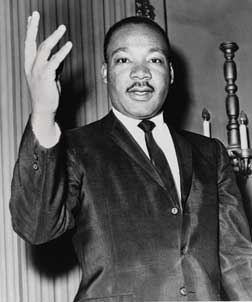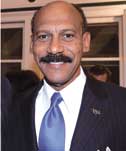Dr. Martin Luther King Jr. Would Be Surprised
 Dr. Martin Luther King Jr.
Dr. Martin Luther King Jr.Dr. Martin Luther King Jr. has now been gone longer than he was with us. So much has happened in the 42 years since his death at age 39. He was here for such a short time yet made such an impact on the world.
I am always amazed at how young Dr. King was during the civil rights movement. I was 21 at the time of his death in 1968 and am now approaching twice the age he was when he wrote the letter from the Birmingham Jail in 1963, gave his “I Have a Dream” speech in 1963, or became, in 1964, the youngest man to receive the Nobel Peace Prize.
Still one can only wonder what Dr. King would think were he to visit us today.
Integration
One of Dr. King’s major goals was to promote a nonsegregated America, where Blacks and other minorities would share with White citizens the civil liberties of this society. No more Jim Crow laws with segregated lunch counters, hotels, buses, trains, and bathrooms. Were he to visit us today, I think he would be pleased at how completely the signs of Jim Crow have been wiped away.
Yet there are signs of resegregation that would concern him. For example, in 1968 the country’s schools were very segregated, with 64 percent of Black students attending schools that were 90 to 100 percent nonwhite. Substantial progress was made, and this figure dropped to 32 percent by 1990. Since then, though, racial segregation has begun to reoccur. Today, about 38 percent of Black students attend schools that are 90 to 100 percent nonwhite.
Unfortunately, Dr. King not only would be surprised by the increasing resegregation of our schools, he also would be surprised at how poorly Black students, Black males in particular, are doing. The graduation rate for Black students was 64 percent in the early 1960s. Today it is only 65 percent. This figure hides a major discrepancy in the national graduation rates of Black girls and boys. My own research on high school completion conducted in St. Louis found girls had a 20 percent higher graduation rate. Harvard professor Gary Orfield is correct in asserting that our society has made virtually no progress in the area of high school completion in the last 30 years.
However, racial integration has made great gains with respect to sports. While America is not yet in a postracial period, it could be argued that some sports appear to be so. We can only imagine Dr. King’s surprise knowing that America’s top golfer for the last decade has been Black, or that two Black sisters grew up to dominate tennis, and that there are now Black professional coaches and quarterbacks.
Poverty, Violence, and Crime
Dr. King’s position on poverty was unequivocal. He said, “The time has come for us to civilize ourselves by the total, direct, and immediate abolition of poverty.” About 30 percent of Black people lived in poverty in the 1960s, a significant gain from the 1940s and 50s, when almost a majority lived in poverty. Today’s poverty rate for Blacks is approximately one in four, or roughly two-and-one-half times that of most other Americans.
I have little doubt that these abysmally high rates of poverty, and particularly those among children, would come as a surprise to Dr. King, himself a soldier in the War on Poverty. He surely would tell us today that the same “passionate commitment” he called for 40 years ago is indispensable for maintaining forward progress on poverty and today’s social problems.
Dr. King was unequivocal on the topic of violence. Indeed, some believe that it was his support of the anti-Vietnam War movement that caused him to lose the support and protection of then-President Johnson. Unfortunately, he never lived to see the end of that war and never knew that 58,000 Americans died, 7,200 of them Black men.
Imagine the surprise Dr. King would experience learning that Black America continues to suffer the equivalent losses of that war. Since 1970, between 6,000 and 10,000 Black men are murdered annually. Surely the ongoing carnage would be something against which he would speak out loudly and urgently.
Dr. King would be surprised—and deeply saddened—at the current state of Black men: Their levels of education have not improved and rates of employment have gone down, but their rates of incarceration have gone up. Today, one in every 10 Black men in America between the ages of 18 and 24 is behind bars, and one-third of those of the same age without a high school diploma are incarcerated.
The State of Families
 Larry E. Davis
Larry E. DavisIn 1965, many Americans were surprised to learn that 25 percent of “Negro” families were single-parent families. Today, some 45 years later, I’m sure Dr. King would be surprised to learn that single-parent Black families have increased to nearly 75 percent, and that roughly 80 percent of Black births are out of wedlock. He might not be surprised that the rate of single-parent households for Whites today mirrors Blacks of 1965, as he knew that the problems that plagued Black America would soon come to haunt White America as well. He certainly would be dismayed to learn that a major building block of our society has fallen into such disrepair.
Politics
Dr. King said that “Few people in America realize the seriousness of the burden imposed upon our democracy by the disenfranchisement of Negroes in the Deep South [which] has led to a crisis not only for Negroes in the South but for Negroes in the swollen ghettos of the North.”
Surely Dr. King would be pleasantly surprised to find that even in the Deep South, many Black citizens now hold elected office. In 1970, there were 1,400 Black elected officials; today there are more than 10,000. But more than any other sign in our country’s stride toward democracy, the fact that America now has a Black President would have surprised Dr. King the most. Like so many, he would view the Obama presidency as a repudiation of America’s racist past and a harbinger of the America of which he dreamed.
What Would He Say to Us?
I have taken the liberty of suggesting some things that might surprise Dr. King about our present society; let me take an even greater risk and suggest some things that he might say to us now.
He might say that, despite the sustained difficulties we face, America is a better place than it was in the 1960s.
He might say that the march towards freedom is never easy, smooth, and steady.
He might say that though we have victories, they are rarely complete and most often represent only a beginning.
He might say that freedom and justice always come with significant costs.
He might say that he, too, is disappointed with the difficulties that many segments of our society continue to experience. Still I believe he might say that we, as a people, must continue to believe in justice.
He might say to us that, as a democracy, we still have much to be proud of and, as a country, much to celebrate.
He might say that although we have made progress, we as a nation have yet to arrive at the promised land, and that as men and women of good will, we must continue to participate in the struggle to build a greater nation and a better world for all.
And finally, he might say that, in light of our last presidential election, we should never be too surprised when we find ourselves surprised at the progress we have made.
Larry E. Davis is dean of Pitt’s School of Social Work, Donald M. Henderson Professor, and director of the Center on Race and Social Problems. On Jan. 17, 2011, the Pittsburgh Post-Gazette ran an abridged version of this column; it was also the basis for a speech he delivered at LaRoche University .
Other Stories From This Issue
On the Freedom Road

Follow a group of Pitt students on the Returning to the Roots of Civil Rights bus tour, a nine-day, 2,300-mile journey crisscrossing five states.
Day 1: The Awakening
Day 2: Deep Impressions
Day 3: Music, Montgomery, and More
Day 4: Looking Back, Looking Forward
Day 5: Learning to Remember
Day 6: The Mountaintop
Day 7: Slavery and Beyond
Day 8: Lessons to Bring Home
Day 9: Final Lessons

